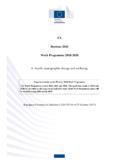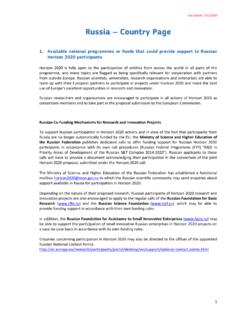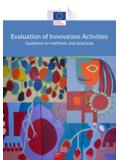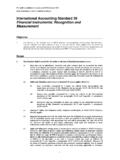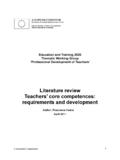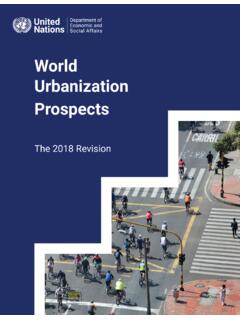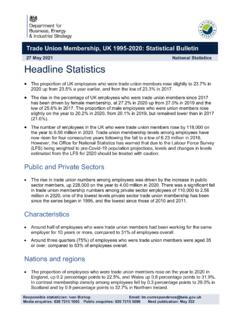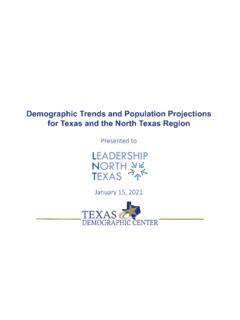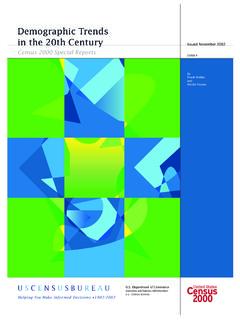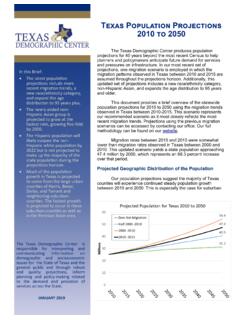Transcription of European Commission Report on the Impact of …
1 Secretariat-GeneralEuropean Commission Report onthe Impact of demographic Change2 | | DRIVERS OF demographic change IN LIFE AGEING MORE MOBILE CHANGING population Impact OF demographic change ON OUR SOCIAL MARKET , WORK AND LARGER AND MORE INCLUSIVE LABOUR THROUGH SKILLS AND AND LONG-TERM Impact ON PUBLIC THE REGIONAL AND LOCAL QUALITY OF LIFE, INFRASTRUCTURE AND ACCESS TO SERVICES224. THE TWIN TRANSITIONS AND demographic CHANGE265. THE GEOPOLITICS OF DEMOGRAPHICS: EUROPE IN THE WORLD28 CONCLUSIONS AND OUTLOOK30 TABLE OF CONTENTS4 | 1 INTRODUCTIONThe outbreak of the COVID-19 pandemic changed Europe and the world within the blink of an eye. It tested our healthcare and welfare systems, as well as our economic and social resilience. It will leave a lasting Impact on the way we live and work together even once the virus has disappeared.
2 And it struck at a time when Europe had already been going through a period of profound transformation through climate, societal and demographic change . demographic change is about people and their lives. It is about what we do, how we work and where we call home. It is about our communities and the way we all live together. It is about embracing the variety of people and backgrounds that enrich and shape our societies, make us stronger and bring to life the EU s motto, United in Diversity. This is more needed than ever. As we slowly and cautiously emerge from the lockdowns imposed across Europe, we are reminded of the importance of understanding and responding to the Impact that demographic change has on our society. This work will have to be factored into Europe s recovery and lessons learnt be it on the social and economic dimension, or on health and long-term care and much more the last weeks and months, the link between demographic structures and the Impact and recovery potential has been sharply and often painfully exposed.
3 We have seen our oldest generation suffer the most, with the elderly being the most vulnerable in this crisis. They are not only at higher risk of complications if they catch the disease but are also some of the most isolated and cut off by the social distancing and lockdown measures taken to save lives across Europe. The need for solidarity between generations is one of the driving forces of Europe s recovery (1). Managing the Impact of long-term demographic change has many different facets: how we manage our public health, public budgets or public life, but also on how we tackle issues like loneliness, care in the community and access to vital services. Addressing these issues will be important for a successful recovery and will determine the speed and the extent to which we will be able to rebuild our everyday lives, social networks and economies.
4 In the longer term, this is an opportunity for Europe to build a fairer and more resilient can never underestimate the damage from the crisis or the need to deal with all kinds of loss. In that context, it may appear contradictory to say that Europeans are generally living longer, healthier and safer lives. However, in the longer-term this is still the reality and we should be proud of the great strides made in the past decades to achieve this. Europe s welfare and healthcare systems are the most advanced globally. Coupled with the skill and sacrifice of so many frontline workers they have helped save countless lives since the beginning of the crisis. However, the stress they were put under, especially in areas with an older population , has shown the need to support them further.
5 Thanks to this progress, our quality of life remains unique and our societies some of the most equal in the world, even if inequalities still persist. We are becoming an older population 4 | (1) COM(2020) 456 final: Europe s moment: Repair and Prepare for the Next Generation.| 5| 5and generally choosing to live in smaller households. We are increasingly on the move, working longer, learning more and changing jobs more often. These trends all have a significant Impact on our society - and some of these may have been factors in the way the virus took hold and spread in some countries, whether it be ageing population , household composition or population issues can often best be addressed at the local and regional level. This reflects the fact that demographic change often varies significantly between different parts of the same country.
6 Some regions face a twin-challenge of low income and rapidly declining population . With 31 million people living in these, mostly rural, regions, the stakes are high. Europe will strive to improve living standards and reduce disparities. It is about ensuring people s needs are catered for and that there are prospects and job opportunities where they live. It is about access to healthcare, childcare and education, as well as other vital local services, such as post offices, libraries or changes in demographics are not new, the difference in our lives is felt more acutely. Addressing this change will be all the more important as Europe embarks on its path towards recovery. Maintaining the focus on the twin green and digital transitions will help provide many of the innovative and sustainable solutions we need to address the Impact of demographic change also affects Europe s place in the world.
7 As the share of Europe s population in the world continues to shrink, the need for the EU to speak and act as one, leveraging all of its collective strengths and diversity, becomes all the more important. This should also be seen in the light of major demographic changes in our neighbourhood and across the world, which will have a direct Impact on Europe Report presents the drivers of demographic change and the Impact they are having across Europe (2). It will help identify how the people, regions and communities most affected can best be supported to adapt to changing realities through crisis, recovery and beyond. The aim of the Commission s work in this area is about improving our knowledge and foresight to ensure we can support those that need it both today and in the future.
8 It is not necessarily about reversing or slowing down any of the trends; it is about equipping ourselves with the right tools to provide new solutions and support people through is ultimately about ensuring that no region and no person is left behind - a feeling which can ultimately lead to a loss of faith in our democracy. This is why this Commission has for the first time a Vice-President for Democracy and Demography and it is why this topic will also feature in the Conference on the Future of Europe, through which citizens will play a leading role in building a more resilient, sustainable and fair Union. While many of the competences in these areas are in the hands of Member States, the Commission is ready to lead the way by identifying issues and supporting national, regional and local action.
9 (2) The Commission Staff Working Document (SWD(2020) 109 final) complements the Report with additional figures, maps and | 2 THE DRIVERS OF demographic change IN EUROPE (3)As Europeans, we are living longer than ever before and becoming an older population with every year that passes. More of us are choosing to live, work or study in another EU country and migration to or from Europe continues to fluctuate. Increasing numbers of us are also now living in smaller households and we are having fewer children than before. These drivers of demographic change vary across Europe, often significantly between different regions of the same country (4). (3) In this Report the terms Europe and EU refer to EU-27 unless otherwise specified.(4) Eurostat statistical data used in this Report are based on figures taken from the Eurostat database in early March 2020.
10 * There are three types of regions used in the common classification of territorial units for statistics, known as NUTS. This map shows NUTS2 regions. The average NUTS2 region in a country has a population between 800,000 and 3 million | Guadeloupe MartiniqueCanariasGuyaneA oresMayotteR unionMadeiraLife expectancy by NUTS2 region, 2018< - - - - - - - > dataLife expectancy at birt h in yearsSource: Eurostat (demo_r_mli fexp) EuroGeo gr aphics Association for the administrative boundaries0500 kmREGIOgis*| LONGER LIFE EXPECTANCY Europeans enjoy longer lives, on average for longer in good health. Life expectancy at birth has increased by about 10 years for both men and women over the last five decades (5). The pandemic has exposed the vulnerabilities of an ageing population , but is not thought likely to have changed this overall positive trend on life expectancy.
